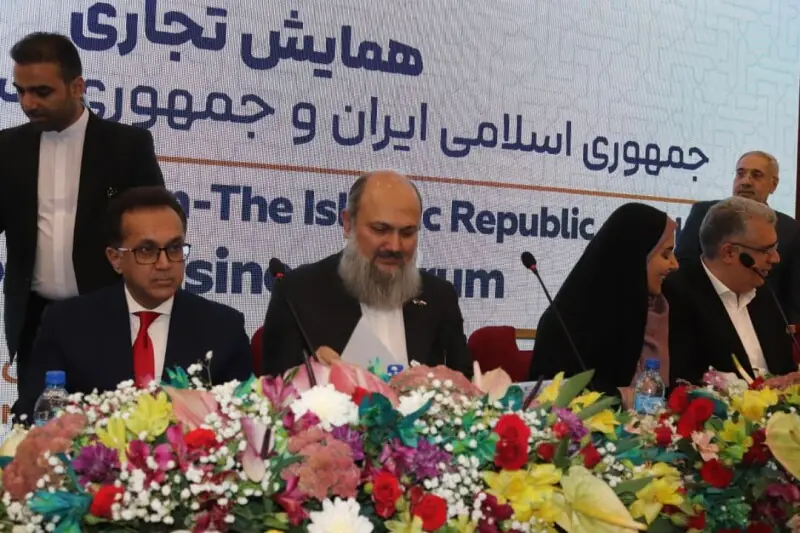Pakistan and Iran reaffirmed their commitment to deepen economic cooperation, setting sights towards boosting bilateral trade toward the $10 billion mark, as Commerce Minister Jam Kamal Khan and Iranian Minister Farzaneh Sadegh addressed the Pak–Iran Business Forum 2025 in Tehran.
Jam Kamal called for a “new chapter of shared prosperity” between Pakistan and Iran as he addressed the Pak–Iran Business Forum 2025 on the sidelines of the 22nd session of the Pakistan–Iran Joint Economic Commission (JEC) in Tehran, read a statement.
Speaking to Iranian and Pakistani business leaders, officials and diplomats, the minister said the business forum — held for the first time at this scale in Tehran — marks “a powerful testament to the unwavering commitment of our leadership and our nations to translate friendship into tangible economic outcomes.”
Khan thanked the Government of Iran, Farzaneh Sadegh, Minister for Road and Urban Development, and the Iranian Trade Promotion Organization for their “gracious hospitality and impeccable arrangements,” noting that “our economic partnership must be as deep and enduring as the religious, cultural and historical bonds that have united our peoples for centuries.”
The federal minister outlined a series of ongoing and planned initiatives to transform bilateral trade, including 17 new protocols under negotiation covering banking facilitation, logistics, shipping, aviation, free zones, high-end manufacturing, agriculture, and investment promotion.
He also highlighted the operationalisation of border markets and special economic zones such as the Manpashin joint market and Gavdar-e-Indan markets to boost livelihoods in border areas.
Kamal also informed attendees on enhanced investor outreach under Pakistan’s new five-year economic transformation plan “URAN Pakistan,” which is designed to expand foreign direct investment in energy, minerals, agriculture and manufacturing.
He stressed that the Government of Pakistan, under Prime Minister Shehbaz Sharif, has placed “the highest strategic priority” on expanding trade and connectivity with Iran, backed by ongoing economic stabilisation and reforms at home.
“Our industrial sector is improving, services and IT are rising, and foreign investment is looking to Pakistan,” he noted.
Khan also invited Iranian companies to participate in Pakistan’s upcoming Agriculture Expo in November 2025, calling it “a gateway to explore manufacturing hubs, meet counterparts and discover new markets.”
Looking ahead, he confirmed plans to hold the 23rd session of the Joint Economic Commission in Pakistan “very soon” to ensure close follow-up on all agreements signed in Tehran.
Farzaneh Sadegh, Minister for Road and Urban Development of Iran, in her remarks, offered heartfelt condolences to the people of Pakistan over the loss of precious lives in the recent floods.
She lauded the “remarkable enhancement” of bilateral trade in recent years, noting it had crossed $3.1 billion last year.
The Iranian minister expressed confidence that, under the vision of both leaderships, the two sides were moving steadily toward the $10 billion trade target.
She stressed leveraging each other’s comparative advantages to strengthen supply chains and competitiveness.
The Iranian minister highlighted Iran’s keen interest in joint investment projects in pharmaceuticals, engineered goods, ceramics and other high-value sectors.
Sadegh underscored that Iran views the Pakistan–Iran Business Forum as a practical platform for accelerating cooperation and generating concrete outcomes for both nations.
The minister concluded by underscoring the shared potential of the two neighbouring nations: “With our immense natural resources, brilliant people, common border and centuries-old corridor of trade, we are determined to overcome challenges and compete globally — together.”


